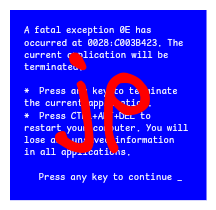Makes me think of the translated Rust versions. Here I found a Spanish variant.
the joke here i think is that sí in spanish sounds like c in english tho
Sí - A direct translation pseudo-language for coding in C and C++ with Spanish keywords. (from Wikipedia)
it’s real
Lua should be in Portuguese.
Python should be in snek.
Java should be in the infernal tongues. Or one of the many languages of Indonesia 🤷
#incluir usando nombres std; int main(vacío) { ca « “¡Hola, mundo!” « terml; volver 0; }
it does make me wonder why programming or markup languages can’t be localised. like imagine if you could do something like root.css or index.php (or w/e) when coding and have the web server or compiler intepret it based on whichever configuration you configure as the base language
Hmm, if you ignore the esoteric versions of existing programming languages I can think of one place where this is done in the wild. That is if you consider Excel formulas to be a sort of programming language ;)
The pain you have to go through when looking for help only in the local language, then giving up and trying to figure out which functions are which in English. Then switching it all to English, then having people ask you for help when they have it in the local language. That is one reason I can think of to not localize a programming language :)
I’ve also had it before where my OS was in English and I coded an Excel formula on there, then sent it to someone with their Excel in German and they couldn’t use the formula then.
Another example of why this is a genius idea.
“Sí más más!” sounds dirty.
As someone who dated a Colombian, can confirm. Add a que rico after that and you’d basically be coding in porn
you’d basically be coding in porn
Promise?
Apparently there is at least one called Latino (I had already looked into this many years ago and I think I had found a different one)
A fun problem I always thought would appear is that “if” is translated as “si” but “yes” is also translated as “si” which, while not really a problem, could cause confusion to newcomers as to what the keyword does. I say not really a problem because it should use “verdadero” (“true”) instead of “si”(" yes"), but it might be confusing anyway
Si (miVariable === verdadero)
They are actually different. Yes has the accent.
Si = if
Sí = yes
Yeah… Accents are a pain.
They are also a pain to type. Where I live there are 2 keyboard layouts: Spanish and Latin. 99% of people don’t know how to tell them apart which means that their hardware keyboard does not match the setting on the computer, so the label on the keyboard does not match with what is typed. There are also two accents in the keyboard: á, and à which are hard to distinguish one the key starts rubbing off.
All of this means that a lot of people don’t even know how to type an accent, and a lot of us never remember when we should be typing them anyway
On top of that this (programming) language, doesn’t even support them. Probably because they cause a lot of encoding issues
you just hold alt and press the letter, por que te parece tan dificil?
Btw, it’s “difícil”. With an accent
Nope. That is not how that works
dale intento con altgr
On my linux at home it types “æ”. But I’ll try tomorrow on windows
On my Linux at home it types nothing but if I press the I key again I get î. I can also do ê, â, ô and û this way.
US Intl Macintosh layout.









